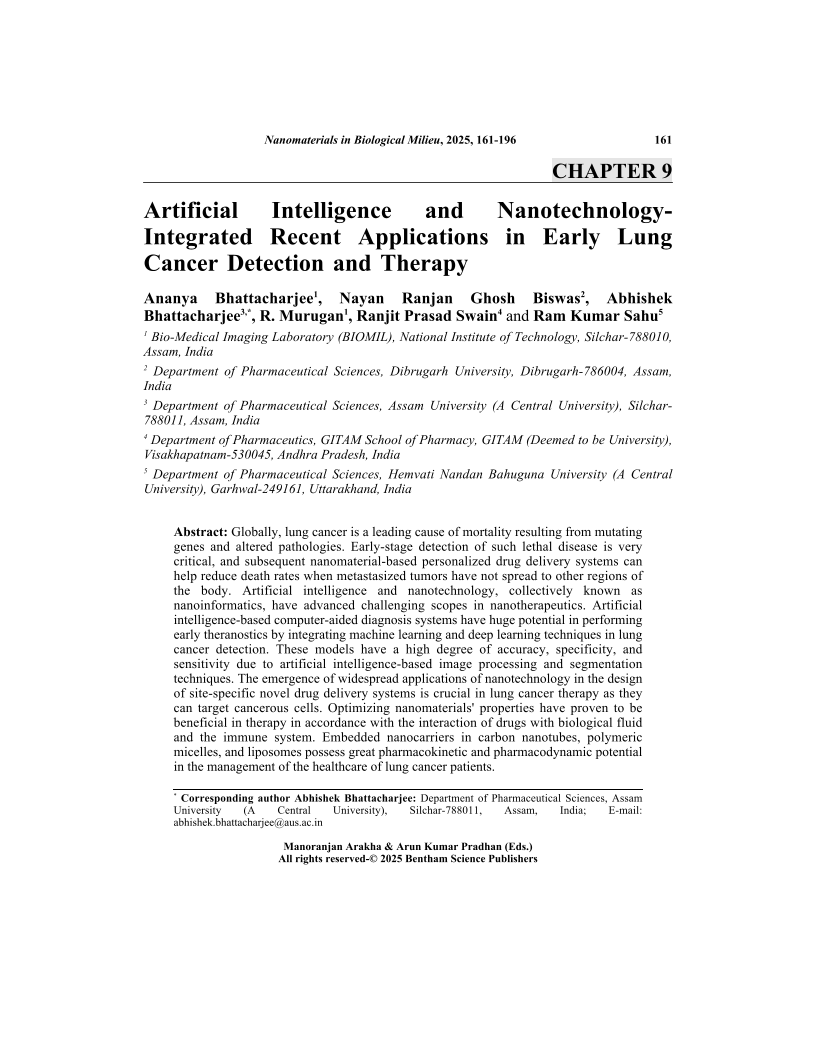Artificial Intelligence and NanotechnologyIntegrated Recent Applications in Early Lung Cancer Detection and Therapy

- Authors: Ananya Bhattacharjee1, Nayan Ranjan Ghosh Biswas2, Abhishek Bhattacharjee3, R. Murugan4, Ranjit Prasad Swain5, Ram Kumar Sahu6
-
View Affiliations Hide Affiliations1 Bio Medical Imaging Laboratory (BIOMIL), National Institute of Technology, Silchar-788010, Assam, India 2 Department of Pharmaceutical Sciences, Dibrugarh University, Dibrugarh-786004, Assam, India 3 Department of Pharmaceutical Sciences, Assam University (A Central University), Silchar788011, Assam, India 4 Bio-Medical Imaging Laboratory (BIOMIL), National Institute of Technology, Silchar-788010, Assam, India 5 Department of Pharmaceutics, GITAM School of Pharmacy, GITAM (Deemed to be University), Visakhapatnam-530045, Andhra Pradesh, India 6 Department of Pharmaceutical Sciences, Hemvati Nandan Bahuguna University (A Central University), Garhwal-249161, Uttarakhand, India
- Source: Nanomaterials in Biological Milieu: Biomedical Applications and Environmental Sustainability , pp 161-196
- Publication Date: June 2025
- Language: English
Artificial Intelligence and NanotechnologyIntegrated Recent Applications in Early Lung Cancer Detection and Therapy, Page 1 of 1
< Previous page | Next page > /docserver/preview/fulltext/9789815313260/chapter-9-1.gif
Globally, lung cancer is a leading cause of mortality resulting from mutating genes and altered pathologies. Early-stage detection of such lethal disease is very critical, and subsequent nanomaterial-based personalized drug delivery systems can help reduce death rates when metastasized tumors have not spread to other regions of the body. Artificial intelligence and nanotechnology, collectively known as nanoinformatics, have advanced challenging scopes in nanotherapeutics. Artificial intelligence-based computer-aided diagnosis systems have huge potential in performing early theranostics by integrating machine learning and deep learning techniques in lung cancer detection. These models have a high degree of accuracy, specificity, and sensitivity due to artificial intelligence-based image processing and segmentation techniques. The emergence of widespread applications of nanotechnology in the design of site-specific novel drug delivery systems is crucial in lung cancer therapy as they can target cancerous cells. Optimizing nanomaterials' properties have proven to be beneficial in therapy in accordance with the interaction of drugs with biological fluid and the immune system. Embedded nanocarriers in carbon nanotubes, polymeric micelles, and liposomes possess great pharmacokinetic and pharmacodynamic potential in the management of the healthcare of lung cancer patients.
-
From This Site
/content/books/9789815313260.chapter-9dcterms_subject,pub_keyword-contentType:Journal -contentType:Figure -contentType:Table -contentType:SupplementaryData105

